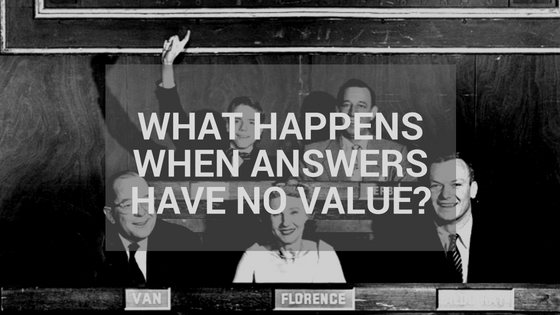At many points in our history the person who had the answers was king. If you knew where the water was to be found, a safe place to sleep, or how to get out of the cold you ruled your kingdom. In recent history, professions we valued most had answers we wanted such as doctors, teachers, and lawyers. Questions always seem to be plentiful, but the answers to those questions had value.
Over the last 18 months as I have settled into my role as a father, I have started to wonder what the world will be like for my child. She'll grow up in a time where literally anything she wants to know can be found in a few clicks. When I was growing up, I spent a lot of time at the library searching the stacks of books for answers to subjects that interested me. I learned the Dewey decimal system and found books on subjects I never thought I would be interested in, but became fascinated with. Even though I lived in a small town the library provided answers to questions that even an eight-year-old me found interesting and thus valuable. It was the answers I was looking for that caused me to go down paths less traveled and find things that stimulated my imagination. If answers have little value, what will stimulate my daughters imagination? If answers can be found in a couple of clicks, what books will not be read? What topics will not be explored?
We can hold more knowledge in our hands in the form of laptop computer or smart phone, than the combined knowledge of all people who have come before us. If you can ask Siri how to get to your destination, what is the value of a map? If you can ask Google how many miles it is to the moon, what is the value of an astronomer? If any question can be answered with a little time behind a browser instead of a textbook, what is the value of an education? If expertise can be found on YouTube, what is the value of a plumber or electrician?
The question about the value of an answer is a fascinating one. It will not be long before computers are doing many tasks that today use expertise. If computers can make medical diagnosis better than doctors, will we no longer value the expertise of a doctor? Someone once said that the value of everything eventually goes to zero, but I can't believe that anyone ever thought that the value of answers would get there.
I don't think we can answer this question and that tells me that our place on earth is to think of questions that can not be answered. Where once the value was in answers, it is now becoming the question that has value. A question that makes us think of answers beyond statistics and probability will always have value. We have to ask better questions.
If I can raise my daughter with this thought in mind I'll be doing a good job.


